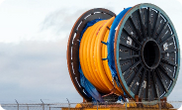A Complete Guide To Generator Power Cords
A generator power cord is a specialized cable that connects generators to inlet boxes or equipment. This guide will teach you to select a suitable generator cord.

What kind of cord do I need for my generator?
Special generator power cords are available in stores and suitable for most generators used in homes and offices. In essence, they are heavy-duty extension cords. These cords are hooked directly to the house through an inlet box, or directly to the appliance like a water heater.
30 Amp vs. 50 Amp
No matter what type of generator cord you choose, the key is to buy a cable of the right amperage. Thus, you should select a 50-amp generator power cord for a 50-amp outlet and a 30-amp generator cord for a 30-amp outlet.
30-amp generators handle up to 3,600 watts of power and are used for RVs, camping, or small home backups. 50-amp generators hold up to 12,000 watts of power for larger RVs and commercial or larger home backups.
The rule of thumb is to select a generator cord that matches the most powerful outlet on your generator, as some generators may have different types of outlets. When selecting a cable, you should always follow the instructions of a manufacturer.
25-amp cords for 25-amp generators and 40-amp cords for 40-amp generators also exist, but they are rarer.
3 Prong vs. 4 Prong

Next, select the cable with the right prong for your outlet. 30-amp plugs for generators are available in two types: 3-prong and 4-prong. The 3-prong variant is designed for 120 volts only, and the 4-prong type can handle both 120 and 240 volts. The 4-prong plugs are becoming more common as many homes have appliances and outlets requiring 240 volts.
For a 50-amp generator outlet, a specialized power cord is typically necessary. This cord usually has a straight-blade male plug on one end to connect to the generator and a twist-lock female connector on the other for connecting to a transfer switch or power inlet box.
Other Styles of Cables For Generators
Aside from regular heavy-duty extension generator cords, more cables with higher voltage and amperage can be used for generators in specific circumstances. These cables include type W, SOOW, and TC-ER. These cables are available at NNC at special pricing. Out of these cables, type W is the most rigid and durable one, SOOW is flexible, and TC-ER falls somewhere in between the two.
Here are some factors to take into consideration when selecting a specialized generator cable:
- SOOW can be used for small portable generators when flexibility is a concern.
- Heavy-duty cables like Type W or TC-ER can be used for industrial generators. Type W is also popular for powering generators on construction sites.
- Type W and TC-ER can also be used for harsher than usual outdoor conditions.
- Longer distances between the generator and the load may require specific types of cables that can handle the voltage drop over a distance without losing efficiency.
- Generators with specific outlet types (like twist-lock or RV-style) may require cords that are compatible with these outlets for a secure connection.
- TC-ER and SOOW can be used for locking connections.
- TC-ER is best for fixed installations that connect generators to equipment or power distribution systems in a facility with some exposed run.
- Type W is best for portable generators on construction sites that require a rugged cable.
- SOOW is suitable for portable generators in commercial settings.


















